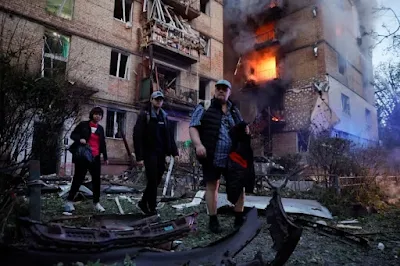Several nights a week, 27-year-old Daria Slavytska packs her toddler's essentials—yoga mat, blankets, and food—into a stroller and descends into Kyiv’s subway system. While air raid sirens pierce the night above, she tries to catch a few hours of sleep safely beneath the surface with her two-year-old son, Emil.
For more than two months, Kyiv has endured relentless nightly drone and missile attacks as part of Russia’s intensified summer offensive. The strikes have pushed the capital's air defences to their limits and left its 3.7 million residents emotionally drained, sleep-deprived, and constantly on alert.
Though other regions closer to the frontlines have suffered far greater devastation since Russia’s full-scale invasion began in early 2022, Kyiv—long considered the most fortified city in Ukraine—is now reeling from the cumulative toll of prolonged aerial assault.
The mood in the capital is shifting. Once a relative safe haven, Kyiv is seeing increasing numbers of residents flock to its deep underground metro stations each night—scenes that echo the haunting images of Londoners sheltering during the World War II Blitz.
“I used to come here maybe once a month,” Slavytska says, speaking from Akademmistechko station in western Kyiv. “That was six months ago. Now we’re here two or three times a week.” She and Emil now sleep curled up on a thin pink mat beside a column lining the subway track.
In July, Slavytska narrowly avoided an incoming strike, racing to shelter as explosions erupted above. These experiences have left lasting emotional scars—especially on Emil, who once trembled at the sound of air raid sirens. “He used to cry and say, ‘Corridor, corridor, mum. I’m scared.’ Now, he just says, ‘Mum, we should go.’”
According to Kyiv’s subway authority, nighttime visits to the city’s 46 underground stations surged to 165,000 in June, more than double the May figures and nearly five times those of June last year. The spike is a direct response to what Kyiv military administration chief Tymur Tkachenko described as the "scale and lethality" of the recent attacks, which have claimed 78 lives and injured over 400 in the capital so far this year.
Even as Kyiv residents grapple with fear and fatigue, their plight is drawing international attention. On Monday, former U.S. President Donald Trump cited the escalating strikes as part of his justification for providing Ukraine with additional Patriot missile systems. “It’s incredible that people stay, knowing that a missile could be hitting your apartment,” he remarked.
The Psychological Cost of War
For families like Slavytska’s, the psychological impact is mounting. A missile strike in April destroyed a residential building just a few kilometres from her home. “It was so loud. Even my son woke up—I held him in the corridor. It was terrifying,” she recalls. She now carries essential documents with her to the shelter, fearing she may not have a home to return to.
A paediatrician prescribed calming medication for Emil and advised her to silence the siren alerts on her phone. Slavytska tells her son the loud noises are “just thunder.”
Experts say the chronic sleep deprivation caused by nightly air raids is taking a serious toll. Kateryna Holtsberh, a family psychologist based in Kyiv, warns that lack of sleep is leading to emotional instability, cognitive decline, and long-term trauma in both children and adults.
A recent study led by Anton Kurapov, a sleep researcher at the University of Salzburg, revealed that 88% of Ukrainians surveyed reported poor or very poor sleep quality—an alarming statistic with potential lifelong implications. “People are living with constant fear,” Kurapov said. “It’s not just about a bad night’s sleep—it’s about survival.”
RAND Corporation researcher Wendy Troxel emphasized the broader economic and military consequences of sleep loss. She cited a 2016 RAND study estimating sleep deprivation cost the U.S. economy $411 billion annually, adding that Ukrainian soldiers' and civilians’ performance could be significantly impaired under such stress.
A New Normal in the Shadow of Fear
The demand for sleep-related products in Kyiv has spiked. Danish retailer JYSK reported a 25% jump in sales of inflatable mattresses and sleep gear during June alone. Slavytska herself is considering upgrading to a more comfortable mattress for her nights underground.
Others have taken more drastic measures. Kyiv resident Kateryna Storozhuk, who had no shelter within three kilometres of her home, spent over $2,000 on a Ukrainian-made “Capsule of Life”—a reinforced steel survival pod designed to withstand collapsing buildings. She now sleeps in it nightly with her Chihuahua, Zozulia. “I developed a lot of anxiety and fear,” she says. “To sleep peacefully in Ukraine, I needed some kind of safe shelter.”
As the war grinds on into its third year, stories like Slavytska’s reflect a growing humanitarian crisis in Ukraine's cities. While the world watches battlefield movements, many of Ukraine's civilians continue to fight their own quiet battles—for rest, safety, and a return to something like peace.




.png)
The opinions posted here do not belong to 🔰www.indiansdaily.com. The author is solely responsible for the opinions.
As per the IT policy of the Central Government, insults against an individual, community, religion or country, defamatory and inflammatory remarks, obscene and vulgar language are punishable offenses. Legal action will be taken for such expressions of opinion.